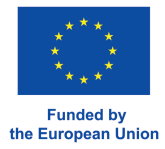This month, we hosted our first technical workshop on accessing and processing data as well as deploying apps in the historical city of Prague. It was an invaluable opportunity for the technical staff of our partners to come together for some hands-on sessions and in-depth discussions. The workshop brought together a multinational team from different parts of Europe. While online meetings have kept us connected, there’s nothing quite like the energy and productivity of working side by side in person.
Day One: Diving into Deployment and Integration

We kicked off the workshop with an insightful talk and tutorial by Nicklas S. Andersen from SDU, who guided us through deploying our applications to the MEMORISE infrastructure hosted at SDU. Utilizing a Kubernetes system, Nicklas demonstrated how we can leverage GitOps and Flux CD for continuous integration, ensuring our deployment processes are efficient and reliable.
Victor Mireles-Chavez from the Semantic Web Company followed with a presentation on our currently deployed APIs, essential for centralized, persistent, and secure data storage and handling. In collaboration with Victor, we fed the Knowledge Graph with diverse data sources, such as testimonies and diaries, and adapted our tools to profit as much as possible from the APIs.

Lukas Novorolnik, a master’s student at SDU, showcased his Curation and Annotation tool, which was met with great interest. Following Lukas, Dante Aviñó from Radboud University delivered a comprehensive talk on AI engines, their architecture, requirements, and dependencies. This session was particularly engaging as we followed up by learning about querying the Knowledge Graph for entities to be integrated into various applications.
The first day concluded with a delightful dinner at Altány Kampa, where we continued our discussions in a more relaxed setting. It was a perfect blend of professional dialogue and personal connection, setting a positive tone for the remainder of the workshop, and featuring the most interesting cheesecake we encountered.

Day Two: Hands-On Implementation and User Focus

After a refreshing night, we resumed with a talk by Chris Bruckner from Charles University, who enlightened us on semantic tagging possibilities. His colleague, Klara Tauchmanova, then discussed Named Entities and their integration into the Knowledge Graph and front-end applications.
We then dove into practical applications, gaining firsthand experience with the integration and deployment topics covered the previous day. Under the guidance of Nicklas Andersen and Richard Khulusi, we fully integrated the Comparative Diary Reader with Kubernetes and deployed Lukas Novorolnik’s Curation and Annotation tool. This hands-on session was a testament to our technical progress, showcasing the robust infrastructure we’ve developed.

Despite the technical advancements, we recognized the need to refine our understanding of user requirements. In a collaborative session led by Camilla Vang Østergaard (SDU) and Richard Khulusi (Bergen-Belsen Memorial), we discussed how the Comparative Diary Reader could be tailored to different user groups, ensuring it meets their specific needs.
Reflections and Gratitude
In just two days, we accomplished a significant amount, from technical implementations to strategic discussions. The workshop left us feeling highly content with our progress and eager for the next steps. A heartfelt thank you to Victor Mireles-Chavez for organizing the workshop and to Pavel Pecina and his colleagues at Charles University for hosting us.
May our future workshops be as successful and productive as this one!

Parts of this post were created with the help of AI-based text generators and grammar tools. All texts were thoroughly fact-checked and carefully edited. Any errors or mistakes are the responsibility of the human authors.



2 Responses
What was the primary focus of Nicklas S. Andersen’s presentation on the first day of the workshop?
My presentation focused on showcasing our technical infrastructure, emphasizing GitOps best practices with CI/CD, using GitLab and Flux CD in a Kubernetes environment for robust application deployment 🙂